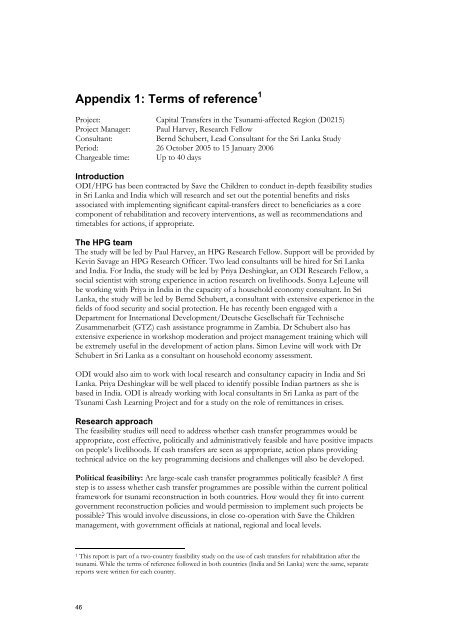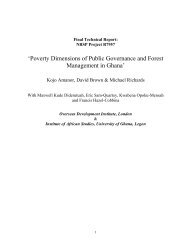Feasibility study on a capital-based income generation scheme for ...
Feasibility study on a capital-based income generation scheme for ...
Feasibility study on a capital-based income generation scheme for ...
You also want an ePaper? Increase the reach of your titles
YUMPU automatically turns print PDFs into web optimized ePapers that Google loves.
CASH FOR RECOVERY<br />
Appendix 1: Terms of reference 1<br />
Project:<br />
Capital Transfers in the Tsunami-affected Regi<strong>on</strong> (D0215)<br />
Project Manager: Paul Harvey, Research Fellow<br />
C<strong>on</strong>sultant:<br />
Bernd Schubert, Lead C<strong>on</strong>sultant <strong>for</strong> the Sri Lanka Study<br />
Period: 26 October 2005 to 15 January 2006<br />
Chargeable time: Up to 40 days<br />
Introducti<strong>on</strong><br />
ODI/HPG has been c<strong>on</strong>tracted by Save the Children to c<strong>on</strong>duct in-depth feasibility studies<br />
in Sri Lanka and India which will research and set out the potential benefits and risks<br />
associated with implementing significant <strong>capital</strong>-transfers direct to beneficiaries as a core<br />
comp<strong>on</strong>ent of rehabilitati<strong>on</strong> and recovery interventi<strong>on</strong>s, as well as recommendati<strong>on</strong>s and<br />
timetables <strong>for</strong> acti<strong>on</strong>s, if appropriate.<br />
The HPG team<br />
The <str<strong>on</strong>g>study</str<strong>on</strong>g> will be led by Paul Harvey, an HPG Research Fellow. Support will be provided by<br />
Kevin Savage an HPG Research Officer. Two lead c<strong>on</strong>sultants will be hired <strong>for</strong> Sri Lanka<br />
and India. For India, the <str<strong>on</strong>g>study</str<strong>on</strong>g> will be led by Priya Deshingkar, an ODI Research Fellow, a<br />
social scientist with str<strong>on</strong>g experience in acti<strong>on</strong> research <strong>on</strong> livelihoods. S<strong>on</strong>ya LeJeune will<br />
be working with Priya in India in the capacity of a household ec<strong>on</strong>omy c<strong>on</strong>sultant. In Sri<br />
Lanka, the <str<strong>on</strong>g>study</str<strong>on</strong>g> will be led by Bernd Schubert, a c<strong>on</strong>sultant with extensive experience in the<br />
fields of food security and social protecti<strong>on</strong>. He has recently been engaged with a<br />
Department <strong>for</strong> Internati<strong>on</strong>al Development/Deutsche Gesellschaft für Technische<br />
Zusammenarbeit (GTZ) cash assistance programme in Zambia. Dr Schubert also has<br />
extensive experience in workshop moderati<strong>on</strong> and project management training which will<br />
be extremely useful in the development of acti<strong>on</strong> plans. Sim<strong>on</strong> Levine will work with Dr<br />
Schubert in Sri Lanka as a c<strong>on</strong>sultant <strong>on</strong> household ec<strong>on</strong>omy assessment.<br />
ODI would also aim to work with local research and c<strong>on</strong>sultancy capacity in India and Sri<br />
Lanka. Priya Deshingkar will be well placed to identify possible Indian partners as she is<br />
<strong>based</strong> in India. ODI is already working with local c<strong>on</strong>sultants in Sri Lanka as part of the<br />
Tsunami Cash Learning Project and <strong>for</strong> a <str<strong>on</strong>g>study</str<strong>on</strong>g> <strong>on</strong> the role of remittances in crises.<br />
Research approach<br />
The feasibility studies will need to address whether cash transfer programmes would be<br />
appropriate, cost effective, politically and administratively feasible and have positive impacts<br />
<strong>on</strong> people’s livelihoods. If cash transfers are seen as appropriate, acti<strong>on</strong> plans providing<br />
technical advice <strong>on</strong> the key programming decisi<strong>on</strong>s and challenges will also be developed.<br />
Political feasibility: Are large-scale cash transfer programmes politically feasible? A first<br />
step is to assess whether cash transfer programmes are possible within the current political<br />
framework <strong>for</strong> tsunami rec<strong>on</strong>structi<strong>on</strong> in both countries. How would they fit into current<br />
government rec<strong>on</strong>structi<strong>on</strong> policies and would permissi<strong>on</strong> to implement such projects be<br />
possible? This would involve discussi<strong>on</strong>s, in close co-operati<strong>on</strong> with Save the Children<br />
management, with government officials at nati<strong>on</strong>al, regi<strong>on</strong>al and local levels.<br />
1 This report is part of a two-country feasibility <str<strong>on</strong>g>study</str<strong>on</strong>g> <strong>on</strong> the use of cash transfers <strong>for</strong> rehabilitati<strong>on</strong> after the<br />
tsunami. While the terms of reference followed in both countries (India and Sri Lanka) were the same, separate<br />
reports were written <strong>for</strong> each country.<br />
46
















